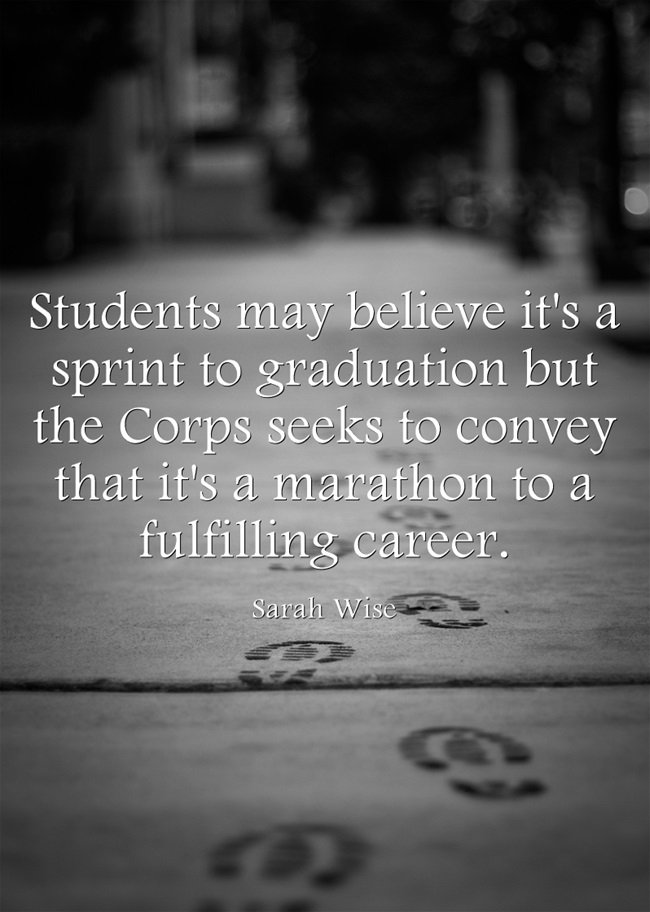SAVANNAH, Ga. – Millions of students are plagued by the age-old question, “What do I want to do for a living?” but the Corps helps to rectify this enigma by offering industry exposure to students at statewide outreach events.
The daunting tasks of deciding curriculums and careers are traditionally incumbent upon students, however, the Corps partners with community and school officials to lift this burden by capturing students early at school- and community-sponsored college and career fairs.
The Savannah District’s outreach coordinators spearhead the Corps’ push to foster innovation and ingenuity needed to increase expertise in the scientific and technical fields. Sarah Wise pilots the Corps’ coastal branch in their concerted effort to promote science, technology, engineering and math, colloquially referred to as STEM, a mission imperative to sustaining a highly-skilled, robust workforce, she said.
Wise, a biologist in the Regulatory Division, coordinates outreach events in her office for internal and external audiences. She works with school, community and government agencies to orchestrate logistical and technical support for seven coastal branch members in the district who, last year, reached more than 27,000 attendees at several outreach events scattered throughout the year, she said.

Recently, Wise and fellow volunteers participated in notable events such as Girls Engineer It Day (GEID) and Megagenesis. Both events facilitated career-oriented exhibitions and workshops to help youth make educated decisions about their careers.
Since late 2013, Wise completed more than 50 hours of outreach communicating Corps messages to schools, nonprofit organizations, state agencies and other relevant entities.
“Last year was one of the most successful outreach years,” she said. “We’ve built such a robust outreach program that we’re pretty well-known in the community.”
And the growing popularity of the program is apparent witnessing the operation of the Corps’ wetlands model, which is an interactive wetland display shown to waves of students at GEID.
“The kids know the [wetlands] model,” she said. “They can run the model and tell their friends how the model works.”
Wise balances her primary duties of evaluating wetlands permits, overseeing compliance and protecting the aquatic environment with helping the Corps drive interests in its missions.
“The beginning months of the year are the busiest,” she said, “But it’s grown to be a self-perpetuating program because of the efforts of our previous outreach coordinator, Stan Knight.”
Wise built upon Knight’s methods by sculpting a comprehensive overview of the Corps’ missions. Outreach events often include interactive demonstrations, artifact displays, and a children’s video explaining regulatory processes. Wise also coordinates field trips for students, most recently with the Savannah-based Independent Learning Network. The
tour offered a glimpse into the Corps’ regulatory practices of preserving and protecting Georgia’s wetlands to coastal Georgia home-schoolers.
“I try to limit outreach to two events per month,” she said. “We’ve started to reach out to other divisions [in the Savannah District], such as engineering, because at a lot of these events, they want to speak with an engineer.”
Civil engineer Beth Williams recently participated in GEID. She regularly provides the engineering perspective for outreach events emphasizing that she helps youth discover disciplines they may be apprehensive to explore.
“I enjoy interacting with students because they often don’t know that careers in STEM are available to them,” she said. “They’re important because it gives students an opportunity to apply what they are learning in the classroom.”
The Corps team performed a large portion of outreach in collaboration with Savannah-Chatham County Public Schools, which operates 53 schools serving approximately 34,500 students. The school system offers specialty programs at area schools. H.V. Jenkins High School, the system’s engineering school has approximately 160 students enrolled in its engineering academy.
Wise collaborated with Jenkins officials to provide support during National Engineers Week, Feb. 22-28, where district volunteers
showcased a variety of Corps missions to its engineering academy students.
“Her efforts this fiscal year have led to more than 150 total hours of outreach in the first quarter,” said Kelly Finch, Regulatory Coastal Branch chief. “She has a passion for this type of work, produces results and excels in her capacity.”
Wise said she embraces her leadership role because she understands the curriculum-to-career disparity faced by many high school and college students uncertain of their career aspirations.

Students may believe it’s a sprint to graduation but the Corps seeks to convey that it’s a marathon to a fulfilling career, said Wise.
“I had an idea of what I wanted to pursue but I would have benefitted from a more career-focused curriculum in high school,” she said. “I could have eliminated a lot of college courses that I didn’t need.”
The Corps offers pathways to federal employment through internships, work-study cooperatives and the Pathways Program available to college students and recent graduates.
Wise herself benefitted from an early introduction to federal service nearly 10 years ago.
She began her career with the Corps as a student working in the Emergency Management Division in 2005. In 2008, she moved to the Regulatory Division as part of the Student Temporary Experience Program, or STEP, which allows students to garner professional experience in their major area of study. Upon graduation, she was offered a permanent position as a regulatory specialist with the Corps, she said.
“Students may spend four years obtaining a degree and have no idea how they want to use it,” she said. “If they’re feeling underprepared to search for jobs, I hope to help them find meaningful work.”
The Corps is a component of the Department of Defense, whose
STEM Education and Outreach Strategic Plan calls for a diverse, world-class STEM talent pool with the creativity and agility to meet national defense needs, according to its website. It employs a variety of scientific and technical professionals in electrical, structural and mechanical engineering, biology, hydrology, physical science and more.
That forms one more part of the answer to the question of what to do for a living.